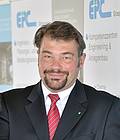

Recycled products with a new product character.
The holistic consideration of the production plant combines mechanical, physical and chemical separation processes in the ideal manner for the particular products. Particular attention is paid to optimizing the cost of the design and implementation of the plant infrastructure, which includes heat recovery as the basis for optimal process control. The high degree of automation in our plants provides the ideal basis for a separate energy management system according to DIN EN ISO 50001. We will be pleased to assist you with the implementation and realization of such a system. As EPC has all the relevant technical planning departments, the planning and implementation of the entire plant comes from just one source. This means that there is only one contact person, and the customer suffers none of the many interface problems that are otherwise typical. This leads to the shortest possible implementation and commissioning times.
EPC Exclusives
A range of modern recycling technologies is available
For example, EPC can offer a number of different PET recycling processes on request. The customer chooses the final processing stage to produce the desired amorphous, semicrystalline or deep-treated end product. EPC will be glad to advice on the best employment of the process stages "Sorting", "Regranulating" and "Refining".
Intelligent design speeds up construction and reduces its cost.
- Consistent quality
- High precision
- High surface quality
- Flexible and diverse designs
- Special solutions
- Quick construction
- Improved cost-effectiveness
- Costs reduced by pre-fabrication (windows, doors, electrical installations and sanitary facilities)
Production is optimized by putting into practice technological developments and further developments of manufacturing processes.
Since its foundation, the EPC Group has regularly developed and successfully marketed new processes. In recent years, it has designed and implemented many research and pilot plants in a wide range of fields.
Optimizing the processes and energy consumption of industrial plants
In all aspects of adapting, optimizing and expanding industrial plants, the EPC Group supports you on all questions concerning plant construction, including consulting, and approval applications and procedures. As an interdisciplinary company, EPC has qualified, highly motivated employees with a high level of knowledge and experience of managing complex plants, and who can quickly detect the interconnections between sections of (part)processes and ancillary plants. By considering industrial plants holistically, we can not only manage plants more efficiently, but also increase their output and reduce their costs.
This applies, above all, to obtaining, providing and recovering energy, for example from heat. We also investigate the potential for saving and recirculating process water, as well as the need and benefit of treating waste water so that it can be reused. Testing and checking through a process control system is essential for monitoring a process and its ancillary systems, and being able to respond for both the short and long term to changes in the process. We can also reduce the additional costs of essential energies and feed materials by implementing an energy management system.







